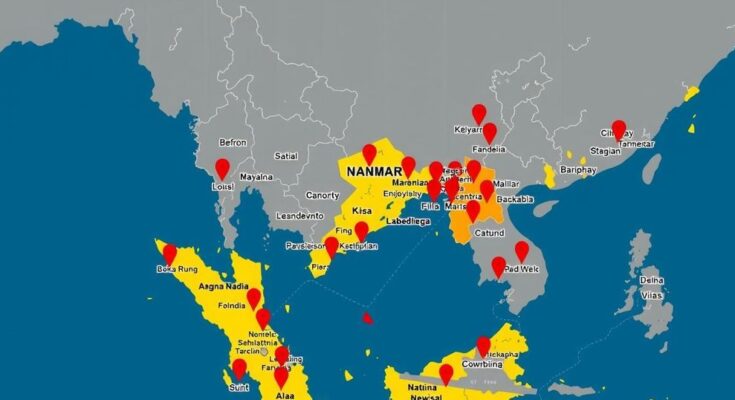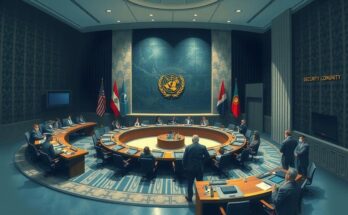Myanmar’s situation mirrors that of Syria as internal conflicts persist under the military junta, with significant atrocities committed by both the Tatmadaw and anti-junta forces. Ethnic divisions and geopolitical complexities hinder progress toward peace, exacerbated by Chinese support for the junta and a fragmented international response. The plight of the Rohingya and ongoing violence highlight the urgent need for reconciliation to end the cycle of civil strife and foster a stable future for all ethnic groups in Myanmar.
Myanmar, under the leadership of Min Aung Hlaing’s military junta, increasingly resembles a battleground rather than a hopeful democracy. Following the anti-coup protests that erupted nearly four years ago, the situation has devolved into a severe civil war with ethnic conflicts erupting alongside state violence. While the Tatmadaw remains a significant force committing numerous atrocities, the anti-junta factions are not exempt from similar actions against local ethnic communities, leading to a blurred moral landscape where violence is perpetuated on multiple fronts. The complexity of armed conflicts has transformed Myanmar into a scenario reminiscent of Assad’s Syria. Various factions, including local ethnic armies, challenge the military regime but lack a unified vision of peace and stability. The Rohingya, a stateless ethnic group, are especially vulnerable, suffering from persecution that now occurs within the conflict parameters set by both the junta and anti-junta forces. Reports from human rights organizations highlight the ongoing genocidal efforts against this minority, showcasing the tragic consequences of the civil strife. Compounding the humanitarian crisis, rising commodity prices and restrictions from neighboring China exacerbate the dire situation for civilians. Initial victories against the military by ethnic armed groups have not translated into long-term solutions for their communities. Instead, retaliatory attacks from the junta have stalled attempts for social reconstruction, leaving local governance in shambles. Internationally, efforts to stabilize Myanmar through organizations like ASEAN have faltered due to internal divisions and varying national interests. Notably, the conflicting geopolitical strategies of major powers, particularly China’s backing of the junta, hinder the pro-democracy opposition’s chances of legitimate recognition or support. The perceived inconsistency in U.S. foreign policy surrounding human rights, illustrated by its support for certain entities, also undermines global faith in the American position as a human rights arbiter. As the conflict persists, calls for a new approach to tackle Myanmar’s deep-seated divisions grow louder. Analysts emphasize the necessity for reconciliation amongst adversaries, urging a collective effort to address underlying grievances rather than perpetuating cycles of conflict. Without a comprehensive strategy that fosters inclusivity and recognizes the rights of all ethnic groups, Myanmar risks descending further into chaos, paralleling the desperate conditions seen in Syria.
The civil unrest in Myanmar originated from a coup in February 2021 where the military ousted the democratically elected government led by Aung San Suu Kyi. This action triggered widespread protests and resistance from various ethnic armies and pro-democracy activists. Despite initial hopes for a unified resistance against the junta, the conflict has been characterized by inter-ethnic violence and war crimes committed by both sides, complicating the humanitarian situation and overshadowing any aspirations for democracy. Furthermore, the involvement of neighboring China, which has backed the military, presents additional challenges for any international intervention aimed at restoring democracy and human rights in the country.
Myanmar continues to face an uphill battle against a backdrop of civil strife that has drawn parallels to the devastation experienced in Syria. Ethnic tensions, humanitarian crises, and geopolitical interests intertwine, complicating paths towards reconciliation and peace. The need for an inclusive approach, acknowledging the rights and voices of all communities, remains critical for the possibility of restoring stability and achieving genuine democratic governance in Myanmar. Without such an approach, the country’s future appears increasingly bleak, trapped in cycles of violence with no clear resolution in sight.
Original Source: asianews.network




